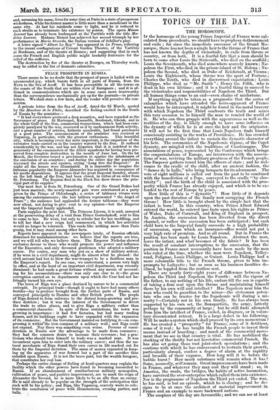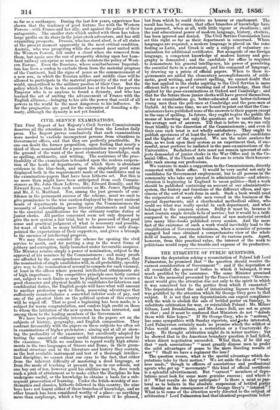TOPICS OF THE DAY.
THE HOROSCOPE.
Ii' the horoscope of the young Prince Imperial of France were cal- culated from precedents, we should have to prophesy dethronement and exile ; for since the immediate successor of the Grand Mo- narque, there has not been a single heir to the throne of France that has not known the depths of vicissitude, in exile from throne or country, or from both. It is a fearful iate that a man should be born to come after Louis the Sixteenth, who died on the scaffold ; Louis the Seventeenth, who died somewhere scarcely known; Na- poleon the First, who died in the prison-island of St. Helena ; Na- poleon the Second, who died as Duke of Reichstadt, at Vienna ; Louis the Eighteenth, whose throne was the sport of Fortune ; Charles the Tenth, who died in discrowned expatriation ; Louis Philippe, who died as " Mr. Smith" ; Henry the Fifth, who is dead in his own lifetime ; and it is a fearful thing to succeed to the vicissitudes and responsibilities of Napoleon the Third. But all human things come to an end—even chains of misfortune. If anything might be taken as a prognostic that the series of calamities which have attended the heirs-apparent of France would here be interrupted, it might be found in the moral bravery with which Napoleon the Third confronts the truth and seizes this very occasion to be himself the man to remind the world of it. He who can thus grapple with the appearances as well as the realities of the day, is likely enough to have some influence on the dynasty of which he is at once the heir and the originator. It will not be the first time that Louis Napoleon finds himself consciously assisting in the works of Providence. He has crowded everything around the infant to sustain the dynastic character of his heir. The ceremonies of the Napoleonic regime, of the Capet dynasty, are mingled with the traditions of Charlemagne. The associations of peace, represented by the Conference which brings the congratulations of Europe, are interwoven with the associa- tions of war, reviving the military greatness of the French people. The Emperor gathers round him the officers of state ; and he wel- comes to the cradle of the child, after an ancient fashion, the " dames de in halle," who bring bouquets for its adornment. The vote of eight millions is called out from the past to be combined with the benediction of a Pope, conveyed to the cradle "by elec- tricity " ; and the birth of the child is associated with the pros- perity which France has already enjoyed, and which is to be ex- tended to the rest of Europe by peace. How little of this is " dynastic" ! How little of it depends upon the past duration of the family now occupying the French throne ! How little is brought about by the simple fact that the infant is born ! In this country, when Prince Albert Edward entered the world, he entered ipso facto upon his rights as Prince of Wales, Duke of Cornwall, and Ning of England in prospect. In Austria, the succession has been diverted from the direct channel, or rather the succession has been anticipated ; but each child born to the Imperial family succeeds to a high probability of succession, upon which an insurance-office would not put a very high rate of premium. And so all round. But in France the position has been made by Louis Napoleon. Abstract the man, leave the infant, and what becomes of the fabric ? It has been the result of constant interruptions to the succession, that the position in France must necessarily have been made by the men who ruled at the time, whether the man were Napoleon, Talley- rand, Polignao, Louis Philippe, or Guizot. Louis Philippe had a more colourable title to the French throne, given to him im- promptu by Lafayette ; but as soon as his business faculties de- clined, he toppled from the restless seat.
There are nearly forty-eight years of difference between Na- poleon the Third and Napoleon the Fourth : will the vigour of the father, to say nothing of his life, endure till the son is capable of taking a firm seat upon the throne and maintaining himself there by his own will and intellect ? Has Napoleon near him the man who could be guardian to the minor—the statesman poten- tate who can be trustee for the Napoleonic will during a mi- nority P—Certainly not in his own family. He has always been supported by his own set, the Bonapartists, the army, latterly perhaps by the community at large. but he still finds alienated from him the intellect of France, exiled, in disgrace, or in volun- tary discontented retreat. It is a large defect in his following. Will he make a system which shall proceed by its own momentum ? He has created a " prosperity. " for France, some of it fictitious, some of it real ; he has taught the French people to invest their means instead of hoarding ; and much of the commercial move- ment that we see in that country is vital. He has mobilized the stocking of the thrifty but not heretofore commercial French. He has also set going those vast joint-stock speculations ; and the cautions with which he has endeavoured to restrain their growth, particularly abroad, confess a degree of alarm at the rapidity and breadth of their expanse. How long will it be before the bubble burst ? How much substance will remain when it has ? Some, assuredly, will remain. Great improvements have been made in France, and whatever they may cost they will stand ; as, in America, the roads, the bridges, the habits of active l000motion, have survived the over-enterprise which called them into existence. Nor is the programme of Napoleon the Third yet ended. The war, he has said, is but an episode, which he is closing ; and he de- signs to be at once the architect of material improvement in France and an example to more backward nations. The auspices of the day are favourable; and we can see at least as far as a soothsayer. During the last few years; experience has shown that the tendency of good fortune hes with the Western Powers—with France and her ally, and against the policy of their antagonists. The smaller state which united with them has taken large profits on its share in the joint-stock adventure, and has still expanding prospects. Prussia, who has stood aloof, is of all states at the present moment apparently in the most critical condition. Austria, who was prospering while she seemed most united with the Western Powers, fell under a cloud when she removed from them, but again sees the sun of prosperity shining upon her Lom- bard railway enterprise as soon as she reenters the policy of West- ern Europe. Even the Russians, whose semibarbarons Imperial- ism has been a cordon to exclude them from the material progress of the Continent, hail the signs of peace as the commencement of a new era, in which the Russian nobles and middle class will be allowed to participate in the material prosperity of the rest of the world, unsacrificed to the military passion of their Czar. But the policy which is thus in the ascendant has at its head the parvenu Emperor who is so anxious to found a dynasty, and who has learned the art of uniting the advancement of France with the English alliance,—bringing to his side the power that could of all powers in the world be the most dangerous to his influence. So far the prognostics are good for the enterprise of founding a dy- nasty, although the dynasty is not yet founded.



























 Previous page
Previous page